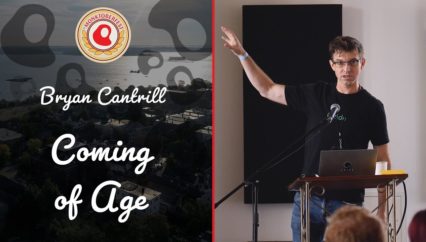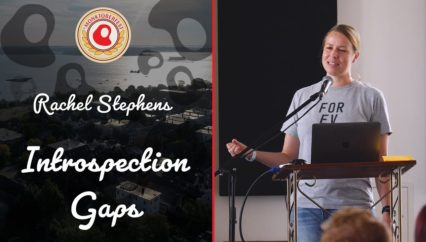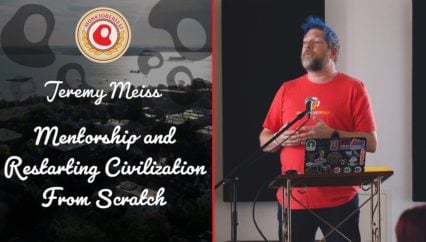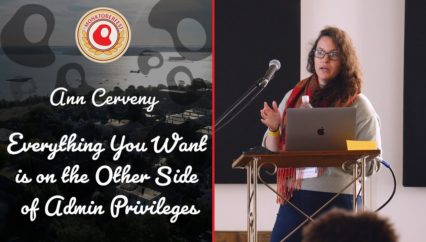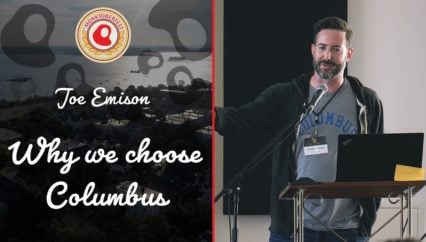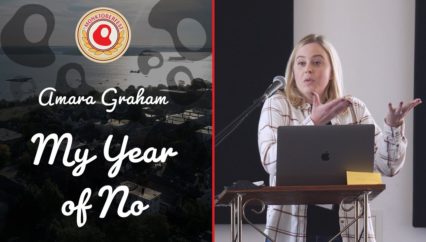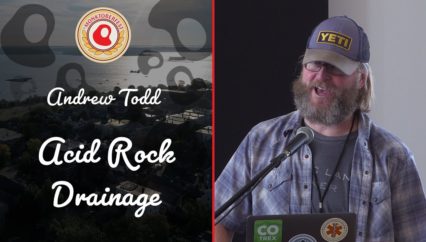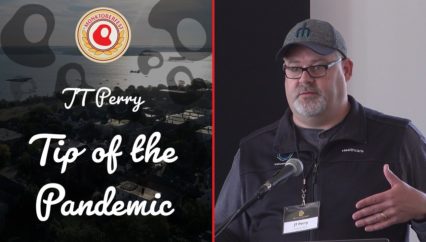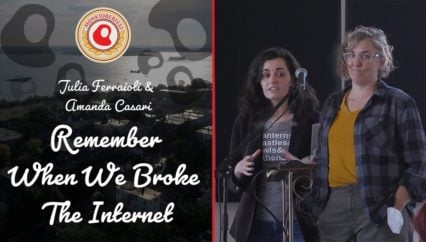“How many conference talks have you seen that are barely-disguised sales pitches? I’m not talking about pitches for services or products, but rather how wonderful the speaker is? This isn’t that talk; it’s a talk about failure. When people encounter certain kinds of failure, they don’t talk about it at all. This happens constantly, and leads others who encounter those same failures to surmise that they just suck–as employees, as people, as partners, etc. This is provably untrue, but how can you disprove it if nobody talks about their failures? In this talk, I’m going to dive deep into some failures of my own.”
Transcript
So I have a standing policy in talks that I never start with introducing myself, because what you’re inherently saying is this is the most interesting high-level thing is who I am and what I’ve done, partial to what I’m justified to be here. But this talk it’s a little bit necessary. For background, for those who, despite what Steve said, don’t flow who I am which I’m told somehow is not a requirement to attend this conference, I run a small consultancy where we fix the AWS build. What people I write a snarky I write a newsletter that makes fun of Amazon for a living because I have no self-preservation instinct and I’m an — the world generally believes that all of these things are triumphs and great successes of my life and from a certain point of view, they absolutely are, but they’re also rooted in failure, because life is what happens to you instead of what you plan.
This talk is called the art of personal failure and I’ve been kicking around the idea for about five years now. It doesn’t fit in most conferences. Most conferences are here’s how we did something, pooches we have screwed, a technical guide. It doesn’t work that way.
So specifically I’m going to talk about failure today. Three stories of personal failure from my life. No more, no less. Some may resonate, some may not. But I’ve been meaning to give this talk for years.
And the time is now. And the place is here.
And I want to start by saying how much I hate this place! Not this room. This is a great venue, don’t get me wrong. But this place. And that’s kind of a bold statement. I mean, who winds up going somewhere and talking to the organizers, Steve, thanks for inviting us, your state is a shithole. No one says that. And to be fair, there’s nothing wrong objectively with Maine.
It’s me. I grew up less than 7 miles from here. This is coming back to face a lot of things that I didn’t think about, and I try not to think about. And it’s here that the failure stories begin.
The first, and this might astound you for folks who haven’t really put it together yet, I didn’t get on super well with the Scarborough public school system. My parents always told me that I was a difficult child to raise, and I smiled and nodded and had no idea what they meant by that and now I have two kids of my own. I get it now!
So I wound up repeating my sophomore year of high school at a boarding school that I was shipped off to and at the end of the year, they’re like, wow, this is a really expensive school, and we sure like money, you know what we like less than that, you coming back. I was expelled. So I went to a different year for my junior year. I am nothing if not efficient and optimized. I got expelled before winter break. So what happened then is I took a homeschooling program’s test and got a diploma. So suddenly there I am having to figure out what’s next for my life, a year and a half earlier than I expected to.
Like, where do you go at the last minute as I saw myself then, a complete academic fuckup?
In case any of you went there, that spells the University of Maine.
[laughter]
And it’s a fine school, but again, this is all from my weird perspective, because I’m kidding but I’m actually not. Because if you grow up where I was raised, viewing state schools that hm, that’s not where the people with potential go. And it was a reinforcing thought that I’m smart, I’m going to go somewhere prestigious and study with the best minds of my profession. Apparently they were all going to Princeton studying how to make people click on more as. That’s great.
So was going to the University of Maine a mistake? I don’t think so, but a couple of years later failing academically? There are all different kinds of failures out there, but I believe the ones that hurt the most, the ones that really stick with you, are the ones that cut against your own self-image. If I strike out at baseball, for example, I don’t care in the slightest, because look at me. Somehow I am even less athletic than I look. The expectations for me on any sort of sporting endeavor are on the floor, the bar cannot go any lower without drilling.
But getting kicked out of school, well, that would mean that I’m dumb, and for my entire childhood that I spent locked away reading books and having no friends, I believed that I was smart and just a little misunderstood.
I still have no degree, to be very clear. This is not a redemption story that I’m telling here. And today it’s a hell of a lot more acceptable in a lot of places than when I grew up and even if it’s for the worst reason and that is simply put that school is no longer affordable to an increasingly large swath of the population and that’s terrible and but on some level there’s’ silver lining to it in that it’s good, because it’s making people reconcile throughout the entire space, that there are multiple paths to what we define as success.
And a degree is not required for all of them. I mean, some of them, yes, if you want to go be a dog surgeon, you’re probably going to have to go to school and get a degree or two, but it turns out that there’s no academic credentialing requirement for shit-posting on the internet, I’m living proof of that. It’s kind of worse than that in my own personal story here, because remember that homeschooling organization I found out that they were not accredited and what that meant is that toward the end of my 20s that on paper I only have an 8th grade education but on balance, they can’t take it away from me, so it is that, and the problem is that from where I viewed the world and the place that I stood, it really felt like it said something about me, and that something was not hugely flattering. I mean today it’s funny. I can tell that story with a bit of a wink and a nod and oh, use me as a cautionary tale, but when I was younger, it wasn’t a funny story. A problem was a lot of those biases that I had, that smart people get degrees from good schools, they weren’t just my biases, they were widely held by hiring managers, and I want to point out yeah, ADHD, tangent. I you can work that into your slide deck. Biases — I don’t think it’s good for example to have a bias that someone with an 8th grade education might have some challenges in a job where a bachelor’s degree is the stated norm and I got through that because of other biases that counted in my favor. I was respectful, I was a real go-getter, a lot of times the hiring managers saw themselves in me. I was professional, I knew how to dress myself. And they just had a good feeling about me.
All of that really distills down to the same thing, which means that I am painfully white dude. I mean, look at me, ketchup is too spicy for me half the time and once upon a time I unironically shopped at L.L. Bean. If you’re wearing L.L. Bean right now, think about that.
Which brings me to second failure story. Academia was clearly not for me which meant that all right, it’s clearly time to go get a job. So packing that bias into the situation I found myself in, it was hard to get a job, but it certainly wasn’t impossible. My default approach was simply not to mention my lack of academic degree or just putting my major without explicitly mentioning whether or not I was still enrolled. And sometimes it fell through. And someone said to me during an interview and I said, no, but I hear you have an excellent job training program here. They prided themselves on that, and somehow it worked and I was able to land a roll there and leading into the corporate vanity, let’s be clear wasn’t the worst direction when you’re trying to persuade someone to take a chance on you. I’ve always been pretty good to have job training interviews. Turns out, with the benefit of hindsight, I wasn’t a great employee. I know! I’m as surprised as you. I had a giant chip on my shoulder and I had something to prove and I can empirically state that employers don’t like that.
I mean, it plays well on Twitter for example, to say the snarky thing that people would want to say but don’t actually too, you just go ahead and say it. It’s funny on Twitter. In an office environments, it doesn’t work because when you point out the hypocrisy in what your boss just said, like, aha, what do you think is going to happen, past me? I’ve pointed out that your argument is inconsistent, that means I’m the manager now. Yeah, it turns out it doesn’t. It was an experience and until I ran my own business, I didn’t really understand the subtext behind a lot of what was going on, interpersonally, in the workplace, sort of strangely, now that I have, I get it now, and if for some reason I reentered the workforce, I do think I would have a much better time of it now that I started to understand what people who aren’t me are thinking about these things. It’s too late for me to fix things from early adulthood, so I got fired a lot. Any idea, pop quiz here, what it means when you’re invited to a surprise last-minute meeting with your boss and someone from HR, and this part is key, they don’t offer you coffee. Yeah. It means you’re about to have a very bad day, and I mean that sincerely. There have been academic studies numerously that have demonstrated that for many folks losing a job is one of the top five most stressful things that can happen to us as human beings. Some people routinely rate it as more devastating than a death in the family. And it happens for one of three reasons.
The first is that the company has layoffs or goes out of business and this sucks, you’ve lost your job, but most people ideally aren’t going to have a significant sense of personal failure tied to it. You weren’t responsible for blockbuster going under, I hope.
Unless you work at Netflix and maybe you kinda were. Our startup means the end of an expected journey. Too bad, so bad. Life goes on, and that’s never happened to me.
The next reason you aren’t going to get fired is because you really need to get fired, you’ve acted dangerously or unethically, you’ve committed fraud, punched a coworker, something you’ve done has made it actively impossible to retain you as an employee. And in this scenario, the odds are terrific that yeah, getting fired is probably a good thing, at least for everyone else. If this happens for you, it’s not the end, there’s always a redemption arc if you need one, but really think about what happened and what changes you need to make in your life. Try and strive to not be as actively dangerous to your employer.
This one also for clarity has never happened to me. Which brings me to the third one, which means you’re a bad fit and this is far and away the most common reason that I see people let go. It means you are expensive to manage, it means you’re not in the right place and this happened to me a lot. And when you get fired, let alone demonstrate a pattern of getting fired, people judge you. Part of what feeds this cycle from where I sit is lack of empathy. Imagine a situation where someone confides in you that they got fired, and I know I’ve done this, some people have an immediate biased reaction to you or at least that’s how it feels. So much of it is projection.
So when someone tells you that they got fired, there’s a lot that you can say, but having seen people get it wrong, one thing I don’t suggest you say is, well, you must have been a terrible employee. It’s also important to remember the audience. In places with decent labor protections like Europe, someone getting fired, it’s very hard to have that happen. Here it can happen because someone has a bad day and doesn’t like you but your job is projected in a lot of places. When you start saying, oh, yeah, I got fired, it sounds like you were stealing from the business as a default. It’s very hard to get fired when it’s not from actual misconduct.
The problem is once this happens it erodes your entire sense of self-worth. We spend more hours at work generally speaking than we do with our own families and there are an awful lot of problems with that, but one of them is we tend to define ourselves by our jobs, our work becomes our identity, so when we get ejected from a company and you don’t do that thing anymore, it’s like you’re losing a part of yourself.
And one of the reasons I founded a consultancy, if I’m being honest here, which is what I’m here to do, is not because I had this flash of blinding insight that was going to revolutionize the entire industry, it’s because I got fired from my last job at Black Rock and every other job that I saw looked like different versions of the exact same thing, another year, at most, working in the same place, wondering every day as I watch my boss walk in, is today the day that it happens? I couldn’t stomach it, so I did what I thought was the only option and built something from which I could not get fired. Can I make it sound like a noble aspirational story? Sure. But it’s not for me when I’m lying in bed not sleeping and wondering about the mistakes I made in yesteryear.
There’s no manual on what to do when you find yourself in this situation, and I’ve made a bunch of mistakes doing t so just a very quick survival guide for all of you, if you’re ever in this position, the first thing to do is stop, breathe, you’re not going to be able to change anyone’s mind in that meeting sign nothing on the site, leave politely. Don’t do a table flip or whatnot. Go get lunch or dinner with a friend, vent, don’t touch social media or your resume for at least a day. Tomorrow is still going to be there, and because of the society we live in, we’ve got to find other ways to make money, which brings me to my third and final story of personal failure.
Maybe — there we go. So we have a debt problem in our society. In case you’ve been oblivious here. In the US medical debt can ruin you. I’ve mentioned previously in this talk that college is now unaffordable for an awful lot of us. The deck is stacked against people, but at least those two examples are relatable and understandable stories. I’ve been very fortunate medically, and I didn’t have to take out loans in order to fail out of college. so on some level, it felt like I missed out on the generational experience there. so instead, I ran up $80,000 in credit card debt in my first year. And that was around my annual salary. It wasn’t buying a super-nice car in a moment of whimsy. It wasn’t like I started a business on a credit card and things didn’t pan out. It was simply, I was terrible with money. And being bad with money is interesting and debt is interesting, based upon who you are and what you do, when the wealthy or governments do it, it’s called deficit spending and it’s a valid strategy for a whole bunch of things. Whereas when a 24-year-old does it, it’s called being a fucking clown or at least that’s how you feel in though moments. I sure did. And debt compounds and gets worse and worse, and you make worse choices because you’re constrained into them. Your credit is tanked so it’s harder to get a decent car to take you to your job so what do you do? You go out and you’re driving an unreliable 1992 Chrysler shitbox an unappreciated classic, I know, that you financed at 22%. And why stop, go out and put dinner on the credit card, because in for a penny in for a pound and it gets worse and worse and worse until you find your way out of it or you die and if you’re lucky enough to get out of it as I was, it forever changes your relationship with money and how you view it. You might guess of hey, Corey, why do you work on AWS builds. Trauma shapes you, it changes you in a bunch of different ways and there’s no one as passionate about things than a zealot. So failing out of school, getting fired a lot, and being deep in debt are my three stories of personal failures.
Why did I pick these? it’s not like I didn’t have more. Why am I giving this talk at all? Well, because Steve doesn’t vet things very well, apparently. But it’s because over the course of my life as I got older and I got closer to people and I told them one or more of these stories, a funny thing happened, because the reaction was interesting, the “you’re a piece of shit” response didn’t happen. It’s because almost everyone I tell this story to is because one of these three things happened to them and nobody ever talks about it. So when it happens to you, you feel like you’re the failure, that no one else has ever been in the place that you’re in. No one else has ever screwed up this bad, because you don’t see it on social media. What you’re doing fundamentally is comparing your own blooper reel to everyone else’s highlight reel, and yeah, no one ever comes out of that looking good. So I came here to a place that I have desperately tried to bury in my own memory here, to tell stories that are still honestly very sensitive to me, that eat at me in the darker hours when I’m waiting to find something else to do, so I can plant a flag and be extremely and intensively public about this, because these things happen to most of us sooner or later and they’re lonely and isolating when they do, and nobody talks about them publicly other than as part of a redemption arc and this is how it shaped the amazing thing that I wound up building. No, I found a way to work with it, but it’s not the hero journey story. I’m not sure because my troubles made me stronger or some bullshit like that. I am what I am to be completely honest is I am deeply and profoundly damaged and I’m doing the best that I can and I’m lucky beyond belief that I found a path that I could walk down where these things weren’t deal breakers, because in a lot of situations they absolutely are. Life is what happens to you instead of what you plan.
I’m Corey Quinn, and I guess I embody personal failure. Enjoy Maine.
[laughter]
[applause]
